Coordinación
Una coordinación sólida puede evitar vacíos y duplicaciones en las respuestas humanitarias, así como garantizar que los PTM complementen otros tipos de asistencia. Sin embargo, el informe del «Estado Global de los Programas de Transferencias Monetarias» de la CALP Network muestra que la coordinación de la asistencia en efectivo es vista como débil y ad hoc, y que esto está teniendo graves repercusiones operativas.
Los donantes, las ONG y los líderes de los grupos de trabajo de transferencias monetarias (GTM) han pedido claridad sobre tres temas principales relacionados con la coordinación de la asistencia en efectivo:
- Quién debe ser responsable de asegurar una coordinación eficaz de la asistencia en efectivo;
- Cuál es la función y el mandato de los grupos de trabajo de transferencias monetarias, incluso en relación con las transferencias monetarias multipropósito;
- Cómo se debe dotar de recursos a la coordinación de asistencia en efectivo.
Tenemos que basarnos urgentemente en lo que funciona y proporcionar claridad a nivel mundial sobre las preguntas arriba mencionadas, adaptándonos a los diferentes contextos. Hace mucho tiempo que se deberían haber tomado decisiones claras basadas en necesidades operativas y no en la política de las agencias.
Prioridades actuales
El objetivo de la CALP Network es contribuir a seguir progresando en este tema en tres niveles: apoyar a los grupos de trabajo de transferencias monetarias a nivel regional; contribuir a soluciones prácticas para la coordinación de la asistencia en efectivo a nivel mundial; y convocar una discusión basada en la evidencia sobre temas clave, destacando puntos de decisión críticos y oportunidades de progreso.
Contenido destacado

Cash Coordination Tip Sheet
Guidelines and Tools
This tip sheet sets out established best practice, key guidance and resources for all aspects of cash coordination, intended as a clear, accessible and action-oriented guide for those engaged in coordination of cash and voucher assistance (CVA) at the field level.

Introducing the Cash Coordination Tip Sheet
Webinar
The CALP Network has developed a tipsheet setting out established best practice and key guidance and resources for all aspects of cash coordination, intended as a clear, accessible and action-oriented guide for those engaged in coordination of cash and voucher assistance at the field level.

Cash Coordination: A proposal from members in MENA
Blog Post
Earlier this year the CALP Network undertook regional consultations to explore options for cash coordination. This blog lays out recommendations from participants from the Middle East and North Africa who sketched out what cash coordination, and coordination more broadly, could look like in future to support a more effective, efficient and accountable response.
Últimos recursos

Market Analysis Tools in Rapid-Onset Emergencies: Phase one report
Report
This report was commissioned by Oxfam’s Emergency Food Security and Livelihood (EFSL) team as part of a larger exercise to develop a market analysis toolkit for rapid-onset emergency situations. The impetus for this arose from the recognition by Oxfam, other humanitarian agencies and donors that the...
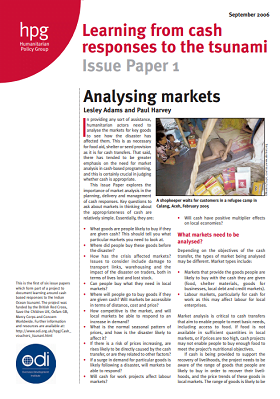
Learning from cash responses to the tsunami: Issue Paper 1: Analysing markets
Report
This is the first of six issue papers which form part of a project to document learning around cash-based responses to the Indian Ocean tsunami. The project was funded by the British Red Cross, Save the Children UK, Oxfam GB, Mercy Corps and Concern Worldwide. This 5-page Issue Paper explores the broad...
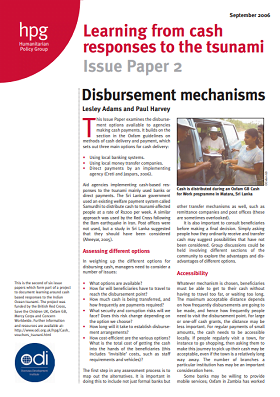
Learning from cash responses to the tsunami: Issue Paper 2: Disbursement mechanisms
Report
This is the second of six issue papers which form part of a project to document learning around cash-based responses to the Indian Ocean tsunami. The project was funded by the British Red Cross, Save the Children UK, Oxfam GB, Mercy Corps and Concern Worldwide. This 5-page Issue Paper examines the...
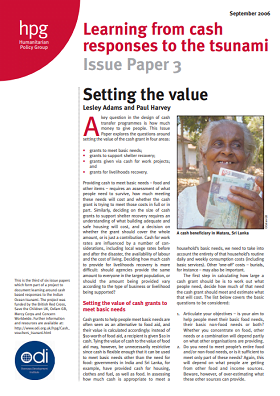
Learning from cash responses to the tsunami: Issue paper 3: Setting the value
Report
This is the third of six issue papers which form part of a project to document learning around cash-based responses to the Indian Ocean tsunami. The project was funded by the British Red Cross, Save the Children UK, Oxfam GB, Mercy Corps and Concern Worldwide. A key question in the design of cash transfer...

Learning from cash responses to the tsunami: Issue Paper 4: Cash and shelter
Report
This is the fourth of six issue papers which form part of a project to document learning around cash-based responses to the Indian Ocean tsunami. The project was funded by the British Red Cross, Save the Children UK, Oxfam GB, Mercy Corps and Concern Worldwide. This Issue Paper highlights some of the key...
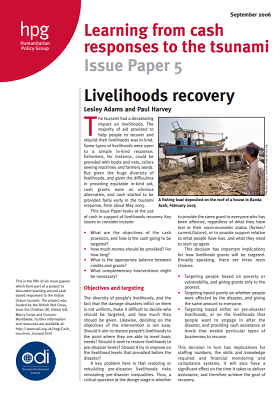
Learning from cash responses to the tsunami: Issue Paper 5: Livelihoods recovery
Report
This is the fifth of six issue papers which form part of a project to document learning around cash-based responses to the Indian Ocean tsunami. The project was funded by the British Red Cross, Save the Children UK, Oxfam GB, Mercy Corps and Concern Worldwide. This Issue Paper looks at the use of cash in...
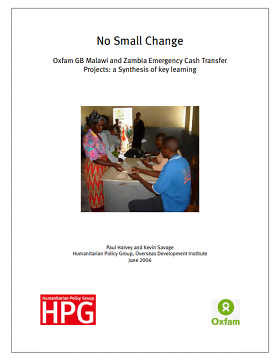
No small change: Oxfam GB Malawi and Zambia emergency cash transfer projects: A synthesis of key learning
Case Study
This learning document uses Oxfam GB’s experience of emergency cash transfer programming in Malawi and Zambia to draw out some important lessons in using cash. It examines the two programmes and the findings of the evaluations and asks the question, “Is cash more cost-effective than food aid?”...

Independent Evaluation of Oxfam GB Malawi’s Emergency Cash – Transfer Programme
Case Study
Poor rainfall in Malawi in the 2004/2005 growing season resulted in significantly reduced cereal and non-cereal food production in the country, leaving up to 4 million people in need of assistance. In response, Oxfam planned a programme in southern Malawi, which included a ‘pilot’ cash-transfer...

Hurricanes Katrina and Rita Disaster Relief
Report
Hurricanes Katrina and Rita destroyed homes and displaced millions of individuals. In the wake of these natural disasters, the Federal Emergency Management Agency (FEMA) responded to the need to provide aid quickly through the Individuals and Households Program (IHP), which provides housing assistance,...

Market-Based Food Assistance Pilot Project Pidie and Lhokseumawe Districts, Banda Aceh: Report of Final Evaluation
Report
This report represents the findings of a final evaluation undertaken for Save the Children Indonesia/Banda Aceh of its Market-based Food Assistance (MBFA) Pilot Project carried out in Pidie and Lhokseumawe districts in early 2006. For 3 months, from February-April 2006, SC/BA implemented a pilot project,...
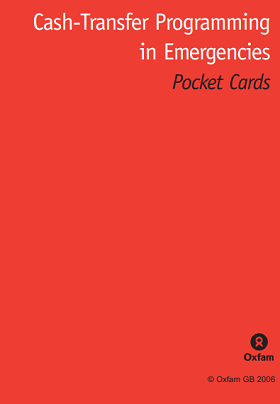
Cash-transfer programming in emergencies – Pocket cards
Report
In emergencies, distributing cash can often meet people’s immediate needs more quickly and appropriately than the direct distribution of commodities. Cash gives people choices and thereby preserves their dignity. These 15 cards contain key elements from the book, which draws on Oxfam’s experience to...

Mapping the Risks of Corruption in Humanitarian Action
Report
The issue of corruption in emergency relief and rehabilitation is a key concern for practitioners, who invest considerable resources and energy in trying to minimise it. However, it has barely been discussed in policy terms, and little researched. This paper aims to map the risks of corruption in the...

Cash Grants and Microfinance in Livelihood Recovery: Experiences from tsunami-affected areas of Sri Lanka
Report
The devastating tsunami that hit Sri Lanka on 26 December 2004 killed over 35,000 people, making it the worst natural disaster in the country’s recorded history. Over 200,000 people were estimated to have lost their livelihoods, half of them in the fishing sector. The major objectives of the study is...

Cash-transfer programming in emergencies
Guidelines and Tools
A compact and concise guide aimed at supporting programme managers to assess whether cash is the most appropriate response in an emergency and choose between different types of cash-based interventions. This guide is based on the experience of Oxfam GB over five years (2000–2005) in a variety of...
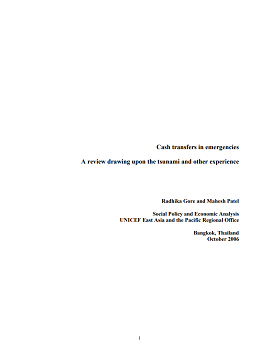
Cash Transfers in Emergencies: A Review Drawing upon the Tsunami and Other Experience
Report
This 2006 document from the Social Policy and Economic Analysis office of UNICEF (East Asia and the Pacific Region) draws upon examples from the tsunami and other contexts to explore cash transfer experience in emergencies. It presents existing evidence of impact of cash transfers on children; reasons...

Voucher Distributions
Report
This document is largely based on the experience gained by GOAL’s team in its response to the 2005 earthquake in Pakistan and aims to discuss:
1. Options for transferring resource to a community in an emergency situation.
2. The appropriateness of the different methods of resource transfer to different
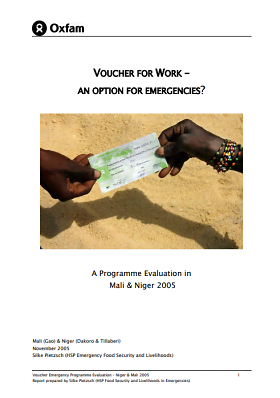
Voucher for work: An option for emergencies?
Report
This Oxfam GB evaluation report gathers successes, constraints and lessons learned during the implementation of two voucher programmes in Mali and Niger, following the food crisis in 2005. It begins by examining the appropriateness of the programme decision-making, and then looks at the two programme...

ODI/UNDP Cash Learning Project Workshop in Aceh, Indonesia
Case Study
This is a report from a workshop on sharing experiences and learning for cash-based interventions. The workshop was held in Aceh, Indonesia in July 2005. The workshop included case studies from Mercy Corps, Panglima Laot, Save the Children, British Red Cross, Swiss Development Corporation, Oxfam and...

Mapping the Market: A framework for rural enterprise development policy and practice
Guidelines and Tools
Markets matter to the rural poor. It is increasingly clear that in tackling rural poverty, market-related issues – including access to information, institutions, linkages and trade rules – are vital considerations. Failure to address these issues means that the benefits of other developments...
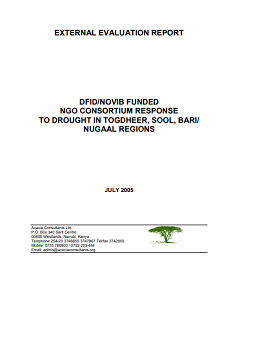
DFID/NOVIB Funded NGO Consortium Response to Drought in Togdheer, Sool, Bari/ Nugaal Regions
Case Study
This is a summary of the June 2005 evaluation of the NGO Consortium response to drought in Togdheeer, Sool, Sanaag and Bari/ Nugaal in Somaliland. The consortium response to drought was meant to provide cash to targeted drought-affected households to help them meet their basic needs. Important among the...


